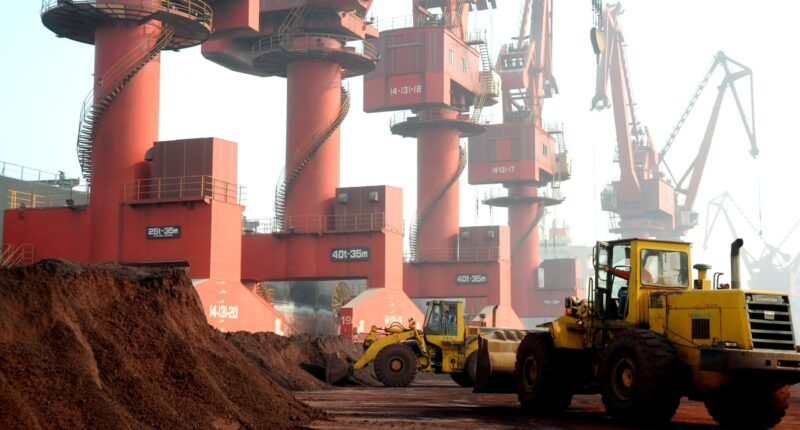Share this @internewscast.com
In a notable response to the recent U.S.-Australia critical minerals agreement, China has emphasized the importance of stabilizing global supply chains for rare earth elements. This call to action comes amidst growing efforts by the U.S. and its allies to mitigate China’s stronghold in the critical minerals sector.
The discussion arose during a press briefing where a spokesperson for China’s Ministry of Foreign Affairs addressed concerns regarding the new deal perceived as a strategic move against Beijing’s influence. The spokesperson, Guo Jiakun, highlighted that the current landscape of global production and supply chains is primarily shaped by market dynamics and corporate decisions, rather than mere geopolitical motives.
Guo further urged nations abundant in critical minerals to take an active stance in ensuring the security and stability of industrial and supply chains. This, he suggested, would facilitate seamless economic and trade cooperation, which is essential for the global market’s health and stability.
Meanwhile, the backdrop of this dialogue is a photograph capturing workers at a port in Lianyungang, Jiangsu province, China, involved in the export of soil rich in rare earth elements, underscoring the country’s pivotal role in the global supply chain.
“The formation of global production and supply chains is the result of market and corporate choices,” Guo Jiakun said, according to NBC.
“Resource-rich nations with critical minerals should play a proactive role in safeguarding the security and stability of the industrial and supply chains, and ensure normal economic and trade cooperation,” he added.
Rare earths are a category of minerals that are critical for a swath of products from cars to semiconductors.
U.S. President Donald Trump and Australian Prime Minister Anthony Albanese on Monday signed an agreement at the White House intended to boost the supplies of rare earths and other critical minerals.
The framework agreement, which was described as an $8.5 billion deal between the allies, comes shortly after China imposed more stringent export controls on rare earths.
China’s Commerce Ministry earlier this month announced expanded curbs on the export of rare earths and related technologies, seeking to prevent the “misuse” of minerals in the military and other sensitive sectors.
Western automotive industry groups have been among those to raise the alarm over the new export controls, saying the measures could pave the way to a period of supply chain chaos.
Prime Minister of Australia Anthony Albanese (L) and U.S. President Donald Trump shake hands after signing a $8.5 billion rare earth minerals agreement during a bilateral meeting in the Cabinet Room of the White House on Oct. 20, 2025 in Washington, DC.
Anna Moneymaker | Getty Images
Demand for rare earths and critical minerals is expected to grow exponentially in the coming years as the clean energy transition picks up pace.
China is the undisputed leader of the critical minerals supply chain, accounting for roughly 60% of the world’s production of rare earth minerals and materials. U.S. officials have previously warned that this poses a strategic challenge amid the pivot to more sustainable energy sources.
Rare earths stocks
George Cheveley, natural resources portfolio manager at investment firm Ninety One, described the U.S. and Australia agreement as a long time coming, but “a good deal” designed to boost the supply of critical minerals outside of China.
“From an investment point of view, it is not so obvious. This is a very small sector,” Cheveley told CNBC’s “Squawk Box Europe” on Tuesday.
“And clearly when you’re dealing with a sector so politicized and where government money is being put in essentially as a subsidy, it is telling you that it is difficult to make it work economically,” he added.
Shares of some of Australia’s largest critical metals and rare earths companies jumped on Tuesday, while others lost ground after an early rally.
Lynas Rare Earths, Australia’s largest rare earths producer by market capitalization, fell 7.6% after posting gains earlier in the session. Mineral sand miner Iluka Resources slipped 0.1%, while lithium producer Pilbara Minerals added around 2.6%.
Latrobe Magnesium, Australia’s primary producer of the critical metal magnesium, notched gains of more than 15%.
Stateside, rare earths stocks were last seen slightly lower in premarket trading. Critical Metals slipped 3.8%, USA Rare Earth fell 5% and MP Materials lost 1.9%.
— CNBC’s Evelyn Cheng and Dylan Butts contributed to this report.








